Our right to roam - victory for Gypsies and Travellers in High Court challenge
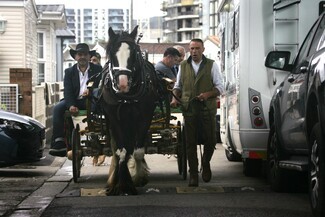
‘Anti Traveller’ law declared “unjustified discrimination” by High Court judge
The High Court has today ruled that certain parts in the Criminal Justice and Public Order Act 1994 that were introduced in 2022 (the anti-Traveller law), amount to unjustified discrimination against Gypsies and Travellers.
Parliament will now have to review the controversial law to ensure that it complies with human rights.
The High Court challenge was brought by Wendy Smith, a Romani Gypsy. She challenged the anti-Traveller law that gave the police new and extended enforcement powers to evict Romany Gypsies and Travellers from unauthorised encampments, and to seize their homes and send them to prison if they failed to leave.
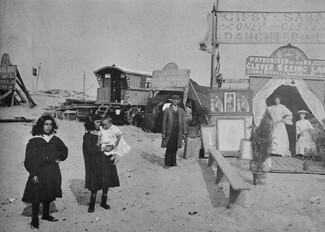
The charity Friends, Families and Travellers supported Wendy Smith with the High Court challenge as interveners.
Abbie Kirkby, Head of Policy and Public Affairs at Friends, Families and Travellers said:
“The new police powers are part of a wider hostile environment against Gypsies and Travellers, particularly for families who have nowhere else to stop.
But, today’s ruling is a triumph for Gypsy and Traveller people, against one of the government’s flagship policies,” added Abbie Kirkby.
“Whilst some of the main provisions in the Act remain, they have been significantly diluted by this ruling.
We extend our congratulations to Wendy Smith and commend her bravery in standing up for what’s right.”
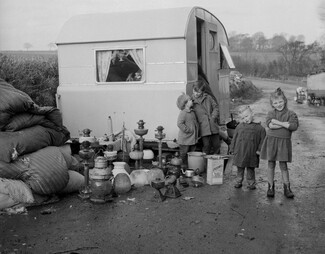
The new police powers made it a criminal offence, punishable with up to three months imprisonment, for Travellers to pull on to land with their homes, and then fail to comply with a request by the owner of the land to leave. The new powers also forbade anyone forced to leave from re-occupying the land within 12 months.
It was this 12 month no return part of the anti-Traveller law that the High Court said was; “unjustified race discrimination in circumstances where there was a lack of authorised transit site provision on which Gypsies and Travellers could camp lawfully.”
The High Court ruling has thrown the use of all parts of the new police powers into doubt, as police must now act within official police guidance , which campaigners say was an attempt by Police chiefs – who have always said that they didn’t want the new law – to water down the draconian powers contained in the original act of parliament.

Marc Willers KC, lead counsel for the claimant, commented:
“This is a hugely significant judgment. In granting the declaration of incompatibility, the Court recognised that there is a lack of lawful stopping places for Gypsies and Travellers and that unless the government increases provision, the law as currently drafted will amount to unjustified race discrimination.”
Chris Johnson, the claimant’s solicitor, commented:
“I am delighted for Ms Smith. Key parts of the enforcement powers introduced by the Police Act have been found to be unlawful race discrimination against Gypsies and Travellers. The National Police Chiefs Council never wanted these new powers and following this judgment, it is hard to see what the new powers will add in practice. I hope that Parliament takes this opportunity to look again at the new powers as a whole.”
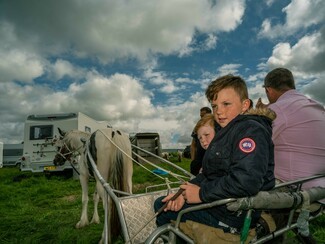
When the anti-Traveller law was first announced by the Government in 2021, it sparked condemnation among Romany Gypsies and Travellers campaigners, who said it would criminalise the nomadic way of life and destroy their heritage.
Drive 2 Survive, a Romani and Traveller-led organisation founded by Sherrie Smith and Jake Bowers, was set up to specifically challenge the new law by holding protests, raising awareness, and building alliances with other minority groups and causes.
On July 7th, 2021 Romany Gypsies, Irish, Welsh, Scottish and New Travellers, Roma, Van-Dwellers and supporters from all over the UK, flocked to Parliament Square in their hundreds to support the Drive 2 Survive rally and show their unity and opposition to the new law , then known as the ‘Police Bill’.
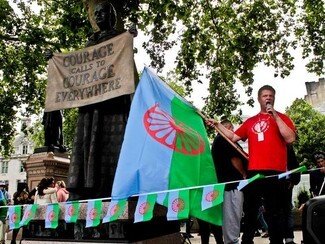
For the Conservative Party that brought in this piece of ineffective performative cruelty, lets hope it becomes another nail in their electoral coffin. When parliament reviews this legislation it is vital that it changes the law to defend a nomadic right to roam.
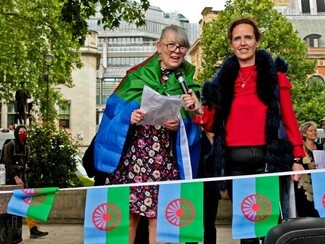
The successful claimant, Wendy Smith, was represented by Marc Willers KC and Ollie Persey of Garden Court Chambers. They were instructed by Chris Johnson of Community Law Partnership (‘CLP’). Chris was assisted by Andy Marlow of CLP.
Stephen Simblet KC and Nadia O’Mara acted for the First Intervener, Friends, Families and Travellers (‘FFT’), instructed by Parminder Sanghera of CLP.
This was Chris Johnson’s final case before retirement. For decades, Chris and his team at CLP have been at the forefront of legal challenges protecting and advancing the rights of Gypsies and Travellers. It is fitting that in his final case the Court has issued a declaration of incompatibility, which will have significant wider implications for Gypsies and Travellers.
Well done to all from the Travellers’ Times, and enjoy your retirement Chris Johnson! What a retirement present - and a gift to our communities!
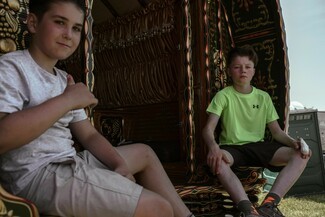
(Lead photo: Romany Gypsy John Doe leads his cart from Stable Way, Hammersmith, to take campaigners to the Drive 2 Survive 2021 rally in Parliament Square (c) Huw Powell)

Gypsy and Traveler Culture in America
Gypsy and Traveler Culture, History and Genealogy in America
Are you a Gypsy, Traveler or Roader, or have some ancestry in any one of such groups? This site is dedicated to you; to help you become more aware of your own rich heritage, to help preserve your traditions, language and knowledge of where you came from and who you are.
The identities of Traveling People are everywhere threatened by the flood of misinformation that is being disseminated on the web and through the popular media. This site pledges to correct such misinformation and to present an accurate and unbiased view of traveling life as it has unfolded since the your ancestors first set foot in the New World.
Preservation of your ethnic heritage and pride in your own ethnic identity are some of the most valuable assets that any parents can leave to their children and grandchildren. To be of Gypsy or Traveler background is something special, something to be treasured along with the language, customs, and cultural values embodied in a unique way of life.
If you want to learn more about your family and your ethnic group, whether you be of Cale, Hungarian-Slovak, Ludar, Rom, Romnichel or Sinti Gypsy or American (Roader), English, German, Irish or Scotch Traveler background we will provide you with an interactive forum for asking questions, finding lost relatives, guidance to accurate sources, exchanging information as well as just keeping in touch with your own kind.
To get started just send a note to ASK MATT specifying what kind of Gypsy you are and in which family background you are interested.
The foundation on which this site is built is a rich storehouse of data of every imaginable kind: documentary sources, oral histories and observations of traveling life collected in over 35 years of unpaid research by Matt and Sheila Salo. The Salos have dedicated their lives to providing a true history of traveling life in America and to dispelling the myths that are currently being spread on the web and other media.
This endeavor is based on the premise that every kind of Gypsy and Traveler has a right to his or her own identity, whatever it might be. Each of you has a unique heritage that your ancestors nurtured over centuries of hardship and persecution. Now those rich and unique identities are in danger of being lost as more and more people lose the sense of who they are; customs, language and traditional life patterns are not being passed on; some people are even becoming ashamed of their Gypsy or Traveler identities.
Again, email any specific inquiries into American Gypsy or Traveler history, culture and genealogy to Matt T. Salo at ASK MATT .
Forthcoming: This history and culture page under preparation will be divided into subject areas that you can access separately depending on your interests. If you seek information sources, have specific questions, or want to broaden your horizons by learning about other groups, we will provide the best, most accurate information available. You will not be fed speculations about Melungeons, hordes of Gypsies in Colonial America, or Gypsies and Travelers as hapless victims or criminal castes - instead all our information will be based on actual verified data that truly represents the experience of your people in America since your ancestors first arrived here.
Culture and language are not easily lost and, unless you are among those few unfortunate individuals whose parents or grandparents misguidedly tried to separate themselves and their families from their roots, you should easily be able to pick up traits of language and culture that indicate your origins. We will begin with a brief overview of the different groups to orient those among you who are not quite sure of where they belong. More detailed descriptions will follow.
Gypsy and Traveler Groups in the United States
Cale: Spanish Gypsies, or Gitanos, are found primarily in the metropolitan centers of the East and West coasts. A small community of only a few families.
English Travelers: Fairly amorphous group, possibly formed along same lines as Roaders (see below), but taking shape already in England before their emigration to the US starting in early 1880s. Associate mainly with Romnichels. Boundaries and numbers uncertain.
Hungarian-Slovak: Mainly sedentary Gypsies found primarily in the industrial cities of northern U.S. Number in few thousands. Noted for playing "Gypsy music" in cafes, night clubs and restaurants.
Irish Travelers: Peripatetic group that is ethnically Irish and does not identify itself as "Gypsy," although sometimes called "Irish Gypsies." Widely scattered, but somewhat concentrated in the southern states. Estimates vary but about 10,000 should be close to the actual numbers.
Ludar: Gypsies from the Banat area, also called Rumanian Gypsies. Arrived after 1880. Have about the same number of families as the Rom, but actual numbers are unknown.
Roaders or Roadies: Native born Americans who have led a traveling life similar to that of the Gypsies and Travelers, but who were not originally descended from those groups. Numbers unknown as not all families studied.
Rom: Gypsies of East European origin who arrived after 1880. Mostly urban, they are scattered across the entire country. One of the larger groups in the US, possibly in the 55-60,000 range.
Romnichels: English Gypsies who arrived beginning in 1850. Scattered across the entire country, but tend to be somewhat more rural than the other Gypsy groups. Many families are now on their way to being assimilated, hence estimation of numbers depends on criteria used.
Scottish Travelers: Ethnically Scottish, but separated for centuries from mainstream society in Scotland where they were known as Tinkers. Some came to Canada after 1850 and to the United States in appreciable numbers after 1880. Over 100 distinct clans have been identified but total numbers not known.
Sinti: Little studied early group of German Gypsies in the United States consisting of few families heavily assimilated with both non-Gypsy and Romnichel populations. No figures are available.
Yenisch: Mostly assimilated group of ethnic Germans, misidentified as Gypsies, who formed an occupational caste of basket makers and founded an entire community in Pennsylvania after their immigration starting 1840. Because of assimilation current numbers are impossible to determine.
This inventory leaves out several Gypsy groups that have immigrated since 1970 due to the unrest and renewed persecution in Eastern Europe after the collapse of Communism. They have come from Bulgaria, Czechoslovakia, Poland, Romania, the former Yugoslavian area, and possibly other countries. They number in few thousands by now, but their numbers are likely to increase.
Copyright @ 2002 Matt T. Salo
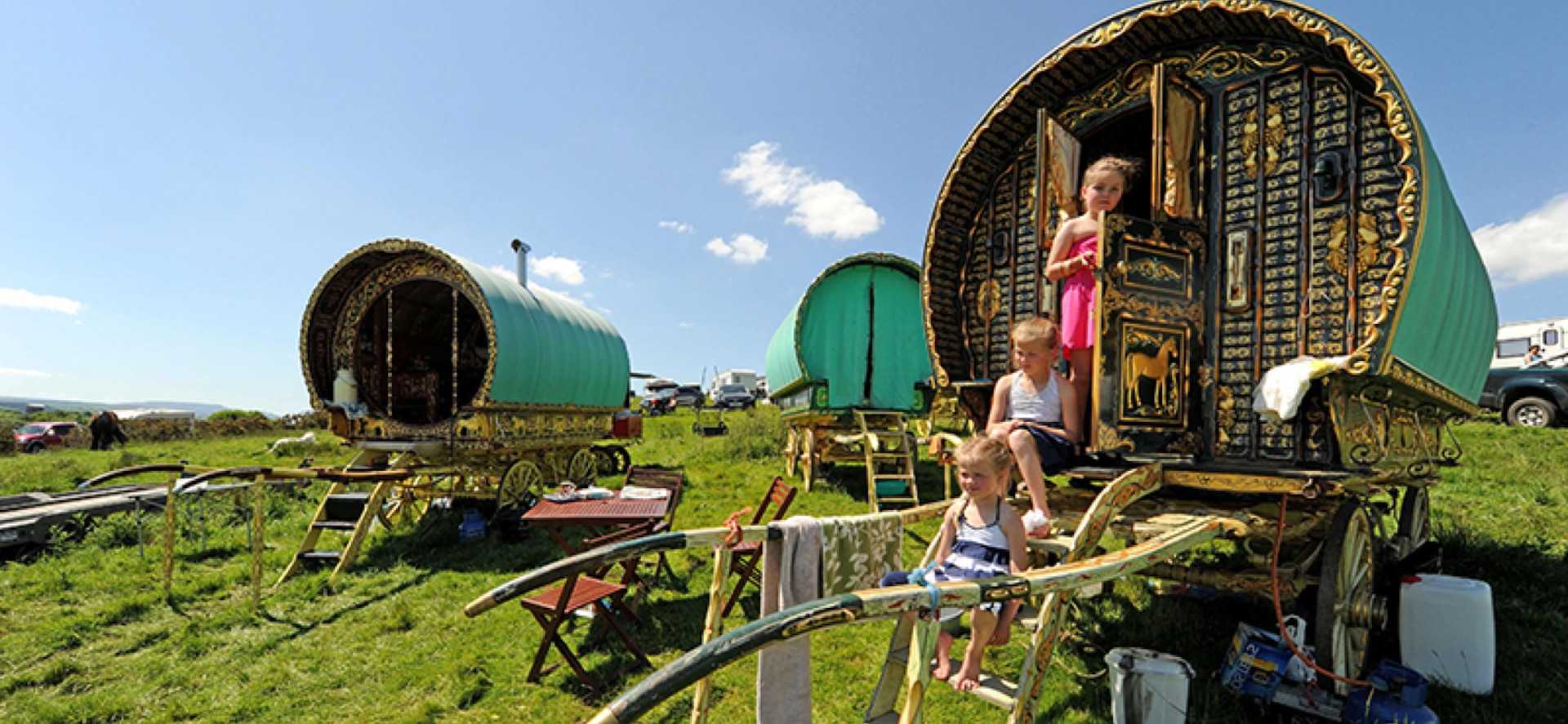
Welcome to the Traveller Movement
Events & activities.
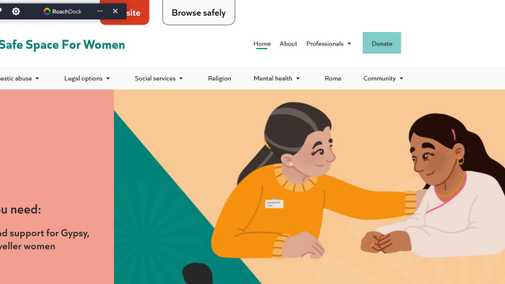
Traveller Movement Safe Space for Women Microsite
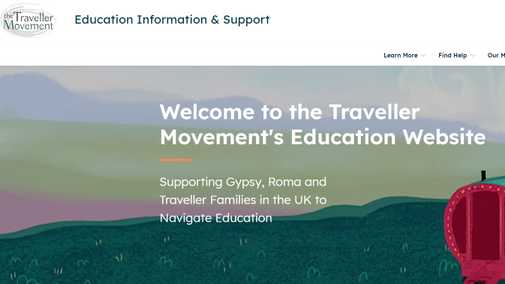
Traveller Movement Education Microsite
Traveller Movement Annual Conference: FUTURE VOICES
Thank you to everyone who attended the Traveller Movement Annual Conference 2023: Future Voices. Please find the 2023 Annual Conference Report here
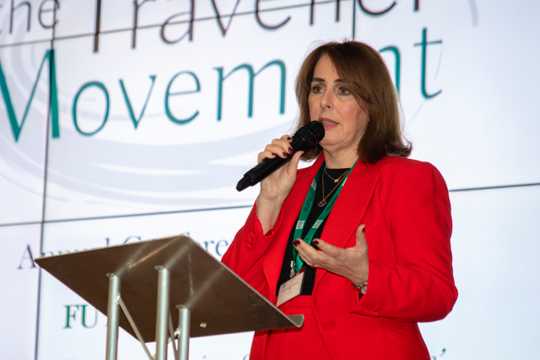
Charity Excellence Framework Quality Mark
The Charity Excellence Framework quality mark achieved by the Traveller Movement, provides demonstrable evidence to stakeholders and funders, of the Traveller Movement commitment to excellence, reassurance our trustees that our charity is well run and recognition for TM staff and volunteers for what they are achieving.

Recipe Book
This recipe book has both tradition and modern, sweet and savoury Traveller and Gypsy recipes from our Facebook group ‘Traveller and Gypsy Recipes and Tips’!
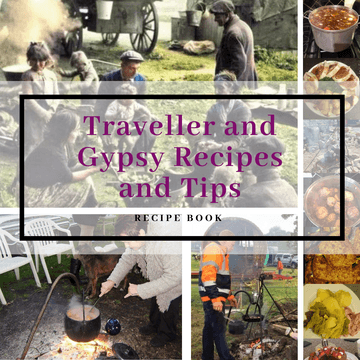
The Way We Work
Community Corner
Read all about the events, news updates and upcoming talent happening in your area!
Information and Support
We have a variety of helpful guides and useful information that will provide you with the support you need
Training and Consultation
We offer professional training and resources to Romani (Gypsy), Roma and Irish Traveller service providers
We address inequalities and discrimination that Romani (Gypsy), Roma and Irish Traveller people experience through our campaigns
- 25,000+ Overall social media followers
- 79,162 Website page views
- 1,017 Event participants this year
Testimonials
For a small organisation they punch well above their weight
Promoting a diverse range of futures for GRT members is vital in gaining greater visibility and wider societal change. The tutoring programme sounds like a great step in that direction!
Thanks so much to all involved; it was excellent training. It was eye-opening and I learned so much. The film was so powerful; I can see how much effort has gone into the film and the training.
Upcoming events
Know your rights session with southwark law centre external link icon.
Join The Traveller Movement and Southwark Law Centre on Tuesday 7th May 2024 between 2-3:30 PM. …
Know Your Rights Session with Howe & Co External Link Icon
Join The Traveller Movement and Southwark Law Centre on Thursday 23rd May 2024 between 2-3:30 PM. …
Know Your Rights Session with Simpson Millar External Link Icon
Join The Traveller Movement and Simpson Millar on Monday 29th April 2024 between 11-12:30 PM. …
Latest blogs

We are hiring!
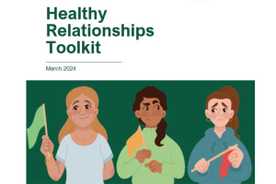
A TOOLKIT BY THE COMMUNITIES FOR THE COMMUNITIES
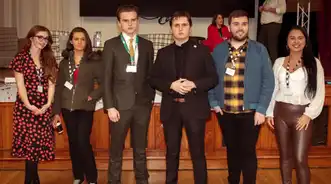
2023 Annual Conference Report released
Current campaigns.

The Traveller Movement launched #OperationTravellerVote to ensure Gypsies, Roma and Travellers are registered to vote and most importantly, have their voices heard during elections.
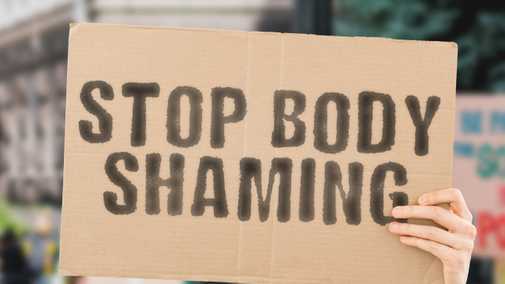

Stop Shaming
We challenge ‘shaming’ as the rise of social media channels allow public humiliation to persist which has been particularly harmful to young women
Subscribe to our newsletter

Gypsy Roma Traveller Police Association
- Get to know us
EXECUTIVE DIRECTOR Jim Davies
Jim is an English Romani and has been a serving Police Constable with Thames Valley Police for over 20 years. He is the co founder of the GRTPA and is the current Chair. He is passionate about changing the stereotypical views that exist and about building more trust between police and GRT. His work around these issues has helped build the association in its first year and has helped bring it to wider public attention.

EXECUTIVE DIRECTOR Petr Torak MBE
Petr Torak was born in the Czech Republic and is of Roma / Gypsy heritage. He has fled from the Czech Republic in May 1999 to seek asylum in the United Kingdom after several racially motivated attacks by skinheads groups.
Torak is a serving Police Constable in Cambridgeshire. Since 2006 Torak has been actively engaging in improving living and working conditions of Roma families in the UK and other European countries. He is a co-founder and current Vice-Chair of Gypsy Roma Traveller Police Association, Project Coordinator at COMPAS Group and has provided tactical advice to Police Forces across the EU and to OSCE. In 2013 Torak became a qualified ROMED Mediator under the Council of Europe.
In 2015 Torak had been awarded with the Most Excellent Order of British Empire (MBE) for his community work with Roma community in Peterborough.

DIRECTOR Tracey Chaney
I am a Police Sergeant serving with Humberside Police. I have 26 years service.
I descend from Gypsy/Travellers with many names in my family. My paternal side is Boswell/Boss and many more including Wilson, this being my maiden name. My maternal side is also Boswell/Boss/Hearn/Heron and many more going back in history. Whilst I have never travelled or lived as a Gypsy/Traveller, my grandfather and every family member before him did. My interests have always centred around their culture and lifestyle. My knowledge of the Gypsy/Traveller culture is vast along with understanding the prejudices that this community face.
In terms of being a Police Officer, I have in the past found it very difficult to reveal that I have Gypsy/Traveller heritage due to the culture of the police force as a whole. However in recent years I have managed to reveal this fact and I believe this is due to me feeling comfortable with the amount of service I have with the force which allows you to have courage to challenge.
The Gypsy Roma Traveller Police Association felt a great relief to me to know that clearly there are other officers around the country with similar backgrounds feeling probably the same as me. I am delighted that this association has been created and am proud to be a member. My aim since becoming a member is to encourage colleagues and communities to feel free to talk.

FINANCE DIRECTOR David Matthews
I am a Nottinghamshire Police officer working at Force HQ, with 21 years service. Having recently researched my family tree I found GRT heritage on the paternal side of my family. I joined the GRTPA soon after discovering this, and am currently the Treasurer. Having previously been a professional photographer/designer I also help out with photography (e.g. the London launch event) and also hope to use my skills to assist Jim Davies in producing & updating the teaching package he has created.

MEDIA DIRECTOR Kelly Edgar
My name is Kelly Edgar, I am a serving police officer with Humberside Police. Over the last 13 years I have worked in various departments including CID, Proactive unit and currently as Community cohesion officer. As CCO I work with minority groups, investigate Hate crime and assisting with the Prevent message.
Through my work as CCO I identified that the G/T community were ‘hidden’. I found that officers attitudes and language was negative when speaking to or referring to this community. I found a similar pattern from the G/Ts in that their attitude and feelings towards the Police was also negative. Through attending static sites and unauthorised encampments I began to understand some of the difficulties faced by this community. I became a member of a multi-agency G/T partnership that meet regularly to discuss issues faced by G/T such as accessing health, education, site facilities etc..Having witnessed discrimination from other agencies towards the community, we act as a voice for them to be heard.
My colleague and I have recently delivered some officer training around the G/T culture and taking questions to establish why or what the One thing we are very clear on is unacceptable language. Having been approached by several officers, confiding in me that they are from the G/T community, I felt that there was no support as they didn’t feel comfortable making this common knowledge. Learning about the GRTPA was a welcome surprise.
I am not a Gypsy/Traveller but feel I have a lot of experience, understanding and passion around the G/T community. I believe I would be a fantastic advocate for this community as I believe each and every one deserves to be treated equally and with respect…and as it stands now I don’t believe this to be true.

MEMBERSHIP DIRECTOR Sergeant Martin Campbell (Hibberd)
I am an English Romanichal serving for Cheshire Constabulary, an excellent force for leadership in equality.
As the Membership Director for the Association I am keen to increase our membership of GRT and non-GRT people by proactively advertising our existence in each force.

DIRECTOR OF INTERNATIONAL AFFAIRS Peter Kotlar
Peter Kotlar, aged 20, from Rotherham (South Yorkshire), United Kingdom is a friendly and enthusiastic young man currently working as a Police Special Constable for South Yorkshire Police. Peter is hoping to become a regular Police Officer (PC) in the very near future and will probably be working for Cheshire Police. Originating from Slovakia, the gypsy male has resided in the UK in excess of 10 years and since passing his GCSEs and getting involved with various activities, he has worked (and still works) in a secondary school focusing on helping and supporting Roma students as a Learning Support Assistant. Prior to that, he has undertaken many tasks and activities, voluntarily, to support and help people of his race. Peter is a typical young man with a keen interest in sports, his favourite being football which he plays and watches as often as he can. I would say that Peter is a born leader; he has always had strong a desire to succeed in life and to achieve anything that he puts his mind to.
Peter’s favourite saying is: “In order to succeed, your desire for success should be greater than your fear of failure.”

SLOVAK REPUBLIC COORDINATOR Zuzana Kotlarova
My name is Zuzana Kotlarova and I am a Roma woman from Slovakia. Since 2005 I am employed by the Slovak Ministry of Interior, currently working as a Referent Specialist in city Humene. My main role is work with the Roma community. In 2009 I had successfully completed a degree at Konstantin Filozof University in Nitra with the focus on social work in the Roma community. In 2013 I had completed PhDr. study at the International Business University with a particular focus on social services and advocacy. I am currently studying at University of St. Alzbeta in Bratislava towards my PhD degree. In 2013 I was invited by the Ministry of Interior of Holland to assist with integration strategy for the Roma community living in Holland. In 2014 I was invited by the GRTPA to the UK to share my experiences with working with Roma community.

CZECH REPUBLIC COORDINATOR Pavla Conkova
My name is Paul Čonková, I was born in Czech Republic, Ústí nad Labem. I graduated from vocational school in the field of legal administration.
In 2007 i joined the Police of the Czech Republic, I attended the annual training in Prague and I was relagated to the traffic police.
During this time I continued to study at a university in Teplice, in the field of legal administration and received a bachelor´s degree.
In 2008 I was reassigned to riot police in Ústí nad Labem, where I work until now the position of inspector. My job is to prosecution, processing and investigating criminal offenses. From 2007 to the present time I have for my job was three times the Advancement.
Currently studying sign language.

- United Kingdom
Related Links
Resource links.
- International edition
- Australia edition
- Europe edition
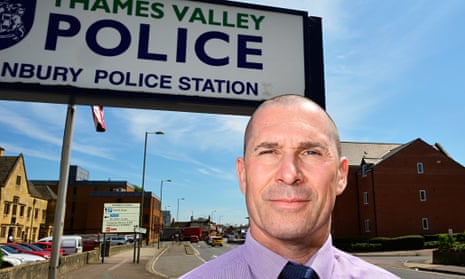
Gypsy police officers band together to beat prejudice in the force
W hen the words Gypsy, Roma, Traveller and police feature in the same sentence, it is usually in reference to some confrontation. The news last week that the Metropolitan police is conducting an investigation into allegations that officers used a secret online forum to air racist views about members of those communities is just the latest example of the depth of the problem. Now, an organisation of GRT police officers is hoping to challenge public perceptions and provide a network for fellow officers, who have often felt isolated in their job.
This month sees the first anniversary of the formation of the Gypsy Roma Traveller Police Association (GRTPA). Formed by a handful of officers, it now has a membership of 105 police staff across 23 of the 43 forces in England and Wales, and Scotland. Members range from a young Romany dog-handler in Kent to an experienced sergeant in Humberside.
“There is an old Romany saying – Gel on pukker nixes – which means ‘move on and say nothing’,” says Jim Davies, a police constable at Thames Valley police and executive director and driving force behind the GRTPA. “That worked for many centuries as a survival strategy, but not any more.”
Davies, who joined the police in 1994, grew up on a caravan site near Banbury in Oxfordshire where his father had a successful tarmac business. But Davies was conscious at an early age that his parents tried to distance him from the community. “It was a protective mechanism,” he says, sitting in the Banbury police station canteen. “Parents will go to quite some lengths to almost ‘de-Gypsify’ their children. You grow up knowing that people will regard you differently, particularly if you live on a site. “Growing up, I knew that there was an issue between the Gypsy and Traveller community and the police without really understanding why,” he says.
Nevertheless, he joined Thames Valley police, after finding himself unfulfilled by work in a bank and in car sales. Initially, he was conscious of the casual attitudes towards Gypsies and Travellers among some officers, whether in the use of derogatory terms like “pikey” or “gyppo” or the general perception of them as criminals. He eventually raised the issue with his senior management, and this led – with the backing of the Police Federation – to an employment tribunal last year at which he claimed he had been subject to racial discrimination through the behaviour of fellow officers. A non-financial settlement was reached, which neither side is allowed to discuss in detail. But it resulted in an independent review of how Thames Valley police engages with GRT communities, and is due to be published shortly.
A year earlier, Davies had decided to seek out other serving officers from his community in the police force. “You can think you’re the only Gypsy Traveller police officer,” he says. A sergeant who had done a lot of work in the area told him he was aware of seven in Surrey. “They had all told him there was no way he was allowed to ‘out’ them.”
In late 2013, a meeting under the auspices of what was then the Association of Chief Police Officers (Acpo) – now the National Police Chiefs’ Council (NPCC) – examined the issue of police relations with the community. There Davies met Petr Torak, an officer with Cambridgeshire police, who had come to Britain as a teenager with his family as refugees from the Czech Republic at a time , in 1999, when Roma there were being attacked by skinheads and far-right groups.
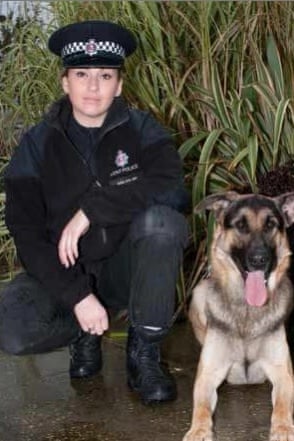
Torak, who had always wanted to be a police officer, spoke little English when he arrived but was encouraged by his father to seek a job in the police. He joined in 2006. “My life mission is promoting the police as a career [to the GRT community],” says Torak, who has just been awarded an MBE for his work with the GRT community in Peterborough. “We have to deal with a very negative media which suggests that all Roma are beggars and thieves.”
At this gathering, the idea was born to “start our own association and challenge that stereotype that sees us as criminals”, says Davies. The official launch in parliament was hosted by Labour MP Andy Slaughter, now shadow justice minister. Full membership is open to all from those backgrounds, honorary membership being available to supporters within the police service.
An email was sent to all police forces. Many of those who got in touch were reluctant to be identified. Davies likens their situation to that of gay officers 20 years ago, when he first joined the police. Since those days, and the formation of gay police organisations, gay police officers have marched in uniform on gay pride marches and reached the rank of chief constable.
“You have two groups who, on the surface, aren’t visible,” he says. “When I joined, it was still unusual to be openly gay in the police, and I heard stories from a few years earlier of physical attacks on gay officers. What they have achieved has given me a lot of heart. I’m not saying the police is perfect now in the way it treats gay people, but there has been a huge improvement in quite a short period of time. I don’t see why the same can’t be achieved for us.”
He hopes that more and more colleagues will feel free to be open about their backgrounds. “You can sense a nervousness about admitting it publicly. People will say, ‘My dad was a Gypsy, that’s why I’m interested’ – and I’ll say, ‘That makes you a Gypsy then!’ You can understand it. If you go back hundreds of years, being recognised as a Gypsy meant death.”
Even today, many in the community are reluctant to identify themselves as such. In the 2011 census, 58,000 people identified themselves as Gypsy or Irish Traveller , although the true figure is thought to be many times that number.
Prejudice is still common, says Davies, whether it is being followed round a store by security staff or being barred from a pub. He shows me a photo of a sign at a Worcestershire caravan site that says: “No loud music, no Travellers, all dogs must be kept on leads.”
One of the biggest recent clashes involving police and Travellers came in 2011 at Dale Farm in Essex . There were violent exchanges around the eviction of families from the site, which led to 34 arrests. “Things like that don’t help because the coverage of it tends not to go into the fact that there are many families who are homeless, and local councils are loth to provide adequate accommodation because of the feeling of their constituents and the fuss that it will cause.”
The police service in general and Thames Valley in particular have been very supportive of the association, says Davies. The Police Federation is helping to organise the GRTPA’s first national conference in November. Mark Watson, a former police inspector who liaises between the NPCC and GRTPA, says that the police nationally were very appreciative of the new association. “Trevor Phillips, when he was the chair of the Commission for Racial Equality, said that prejudice against the community was ‘the last acceptable form of racism’ and, sadly, that’s probably still the case – so I don’t blame people for being reluctant to identify themselves,” Watson says. “We want to try and change that.”
The association has also been welcomed by the community from which it sprung. Matt Brindley, policy and research manager of the Traveller Movement , which aims to involve the GRT community in decision-making processes at a national policy level, says the association’s existence has already “dramatically improved how Thames Valley, Cheshire and Humberside police – to name but a few” engage with the wider community. Police officers can now be seen as “role models challenging the negative stereotypes too often seen in the media”, he says.
For Davies, Torak and the growing number of colleagues, like dog-handler Kate West in Kent and police sergeant Tracey Chaney in Humberside, the time when they felt they had to “move on and say nothing” has clearly passed.
“In 26 years in the police I never thought I would see the day when there was an organisation like this, so I’m very proud to be a member,” saysChaney, who is a director of the association. “I didn’t feel able to tell colleagues about my background until about two or three years ago. I’m visible, but I know there are others in the organisation and in the police who don’t feel able to be yet.”
The GRTPA website carries testimonials from serving officers recounting their experiences.
Here are two, the first from a former decorated soldier.
“The month I left the military I visited my grandparents who had stopped at a site, taking with me my prized medals along with the union flag I had brought in a charity raffle held for a friend who died in service. Leaving my grandfather’s site I was stopped by the police, they searched my car and upon finding the medal asked me: ‘Who have you stolen this from?’ My reply, ‘Her Majesty’, reflected the attitude of the officers. Needless to say they appeared rather embarrassed when they found my military ID card and compared that to my name engraved on the side of the medal. Ironic as within less than a week I was about to swap that military ID card for a police warrant card. The examples of racism towards GRT people and communities during my time in the police have been frequent, offensive and unchallenged, much to my shame. After eight years of silence, I decided to join another constabulary and be proactive in promoting my heritage. I can honestly say that the people who are aware I am a Gypsy have made no derogatory remarks in front of me.”
“Control room calls up, a shoplifting in progress, two female shoplifters, any units free? Silence. Repeat, shoplifting in progress, any units free to deal, shop staff believe they are Travellers. Suddenly, four units are available and all sorts of people offering ‘backup’ for two unnamed/unconfirmed women!”
- Roma, Gypsies and Travellers
Comments (…)
Most viewed.
92 episodes
Lisa Brown discusses all things relating to Supported Living Property.
The Supported Living Property Podcast Lisa Brown
- JUL 19, 2023
094 - Getting Hospital Discharge Right with Sam Sly
In this episode Sam Sly shares how she helps people plan for hospital discharge, she explains why so many people with autism and/or a learning a disability are in hospital . Sam draws on her experience to give examples of planning for transition from a hospital or treatment unit to a home in the community. She gives some great advice about managing neighbors and why things can go wrong. Sam is a Regulation, Health and Social Care consultant working as Sam Sly Ltd (Enough is Enough Time4Change). She is a registered social worker with 30 years of extensive experience working as a support worker, social worker, commissioner, regulator and support provider. Sam developed the process and coined the phrase ‘Life Planning’ which describes the type of person-centered planning Sam Sly Ltd and the Associates at I’m Out of Here use. Sam was part of the Change Team seconded in to transform services in Cornwall post the Budock Hospital scandal and led on the closure of NHS campus provision in Bournemouth. She has an MSc in the regulation of health & social care. Alongside Life Planning Sam does consultancy work for a range of Support Providers, Voluntary Organizations, NHS England, Integrated Care Boards & Local Authorities nationally. Sam spent four years from 2011 setting up, co-owning and as operational Director for Beyond Limits a small dynamic support provider carrying out person- centred planning with people with learning disabilities detained in Assessment & Treatment Units and providing bespoke services for them on return to their local communities. It was here that she developed Life Planning based on a process being used by Partners for Inclusion. [email protected] [email protected] 07900424144 Enough Is Enough - Time4Change! Lisa became a property investor after a long nursing career. She initially developed heritage properties and then a chance encounter led her to discover supported living. She realized this was a powerful way to invest in property while creating homes for those who need them most. Lisa set about discovering why property investors struggle to let their properties to supported living providers and why providers struggle to find property to let. She has been educating people, raising awareness and working on solutions to this problem ever since. Lisa is the host of the Supported Living Property Podcast and YouTube channel and formed The Supported Living Property Facebook Group. Lisa is founder of The Supported Living Property Network, a place for property investors and supported living providers to connect, build relationships and communicate about property they have available and/or need. Membership includes access to training courses, monthly training events and networking events. To find out how you can join The Supported Living Property Network please follow this link: https://lisabrown.uk/supported-living-property-network/ You can find out more about Lisa and how you can work with her at her website: http://www.lisabrown.uk Download your free guide to Supported Living Property here: https://lisabrown.uk/supported-living-property-guides-to-download/ To find the video versions of these episodes please go to: https://www.youtube.com/c/LisaBrownProperty Thank you for listening, please do leave a review and subscribe to keep up to date with future episodes.
- JUL 12, 2023
093 - Creating Homes for Veterans with Lisa Kelly-Tonge
In this episode Lisa Kelly-Tonge talks about her journey from being in the RAF to becoming a property investor. Lisa explains how she creates homes for veterans and helps us understand some of the challenges veterans face. She gives some advice for property investors who are interested in creating these much needed homes for veterans. Lisa Kelly-Tonge is founder of Kelton Homes Ltd. After 16 years in the Royal Air Force, it made sense to combine her passion for the military and passion for property. With lived experience of military life and experience of supporting military families throughout her career, she understands the balancing act of work and home life. Since leaving the RAF, she has made it her mission to understand some of the issues and focus her business on solving property problems. Kelton Homes supports the military family; serving, veterans and other family members too. We provide the house and the create the home. Lisa is married to Lucy, who is currently serving in the military and they have a son called Joshua. LinkedIn - https://www.linkedin.com/in/-kelly-tonge/ Facebook - https://www.facebook.com Website - https://www.keltonhomesltd.co.uk Lisa became a property investor after a long nursing career. She initially developed heritage properties and then a chance encounter led her to discover supported living. She realized this was a powerful way to invest in property while creating homes for those who need them most. Lisa set about discovering why property investors struggle to let their properties to supported living providers and why providers struggle to find property to let. She has been educating people, raising awareness and working on solutions to this problem ever since. Lisa is the host of the Supported Living Property Podcast and YouTube channel and formed The Supported Living Property Facebook Group. Lisa is founder of The Supported Living Property Network, a place for property investors and supported living providers to connect, build relationships and communicate about property they have available and/or need. Membership includes access to training courses, monthly training events and networking events. To find out how you can join The Supported Living Property Network please follow this link: https://lisabrown.uk/supported-living-property-network/ You can find out more about Lisa and how you can work with her at her website: http://www.lisabrown.uk Download your free guide to Supported Living Property here: https://lisabrown.uk/supported-living-property-guides-to-download/ To find the video versions of these episodes please go to: https://www.youtube.com/c/LisaBrownProperty Thank you for listening, please do leave a review and subscribe to keep up to date with future episodes.
- JUL 5, 2023
092 - The Impact of Supported Housing with Imogen Blood
In this episode well known researcher Imogen Blood discusses her recent research into the impact of social housing. They looked at a wide range of services and tenant groups and studied the interaction between health and supported housing services. They examined the impact of supported housing on health and found how complex tenants support needs actually are, with many tenants experiencing one or more physical and mental health need. Imogen shares some important guidance from the research for supported housing providers to take into practice. Imogen Blood began her career working in supported housing for people experiencing homelessness and is a qualified social worker. She then moved into research and held several university and charity research posts before setting up the social research consultancy Imogen Blood & Associates in 2009. Her research interests are wide-ranging, and she has carried out various national studies and local strategic reviews on housing with support and/or care. These include the Supported Accommodation Review and the Evaluation of the Supported Housing Oversight Pilots for the UK Government, as well as studies funded by supported housing providers and charities such as National Housing Federation, Riverside Housing Group and the Joseph Rowntree Foundation. Here is the link to the study https://www.housing.org.uk/globalassets/files/supported-housing/final-version-summary-supported-housing-homelessness-health-2.pdf Lisa became a property investor after a long nursing career. She initially developed heritage properties and then a chance encounter led her to discover supported living. She realized this was a powerful way to invest in property while creating homes for those who need them most. Lisa set about discovering why property investors struggle to let their properties to supported living providers and why providers struggle to find property to let. She has been educating people, raising awareness and working on solutions to this problem ever since. Lisa is the host of the Supported Living Property Podcast and YouTube channel and formed The Supported Living Property Facebook Group. Lisa is founder of The Supported Living Property Network, a place for property investors and supported living providers to connect, build relationships and communicate about property they have available and/or need. Membership includes access to training courses, monthly training events and networking events. To find out how you can join The Supported Living Property Network please follow this link: https://lisabrown.uk/supported-living-property-network/ You can find out more about Lisa and how you can work with her at her website: http://www.lisabrown.uk Download your free guide to Supported Living Property here: https://lisabrown.uk/supported-living-property-guides-to-download/ To find the video versions of these episodes please go to: https://www.youtube.com/c/LisaBrownProperty Thank you for listening, please do leave a review and subscribe to keep up to date with future episodes.
- JUN 28, 2023
091 - Creative Housing Solutions in Supported Living with Jayne Knight
In this episode Jayne Knight talks about the many different ways housing for people with a support need can be set up. She explains the importance of respite housing to prevent hospital admission. She draws on her experience to share some examples of housing that has worked well in the past and describes some creative housing solutions that can be used today. Jayne Knight has worked in the field of specialist supported housing and care for the past forty years. She started her career in the Civil Service, working in the Benefits system. She then moved to Local Government where she became a Chief Officer responsible for specialist housing and care. She then became the CEO of a charity called Ling Trust who help move people out of long term hospital settings. For the past ten years Jayne has been working as a specialist, voluntary advocate through her social enterprise, My Great Life CIC. Her advocacy is with people with complex support needs who have been stuck in hospital assessment units for many years. She regularly attends the Court of Protection and supports families who self represent. Jayne was the first person to create a model called “do it yourself shared ownership” now called HOLD. This enabled a woman who was going to be sent to a secure unit 26 years ago to purchase her own home. She received an award in the House of Lords, for this achievement. HOLD is now a long used and recognized system of getting housing. She also had an award recently from a national newspaper from families who had nominated her as ‘ the peoples person’. Jayne is one of the original authors of the REACH standards. She has regularly been asked to speak on the BBC both radio and television as an expert in her field. She is a member of several Government working groups including the Building the Right Support Advisory Group and the Supported Living Improvement Coalition with CQC Management. Jayne runs a voluntary website called youknow.org.uk. Mygreatlife.org Lisa became a property investor after a long nursing career. She initially developed heritage properties and then a chance encounter led her to discover supported living. She realized this was a powerful way to invest in property while creating homes for those who need them most. Lisa set about discovering why property investors struggle to let their properties to supported living providers and why providers struggle to find property to let. She has been educating people, raising awareness and working on solutions to this problem ever since. Lisa is the host of the Supported Living Property Podcast and YouTube channel and formed The Supported Living Property Facebook Group. Lisa is founder of The Supported Living Property Network, a place for property investors and supported living providers to connect, build relationships and communicate about property they have available and/or need. Membership includes access to training courses, monthly training events and networking events. To find out how you can join The Supported Living Property Network please follow this link: https://lisabrown.uk/supported-living-property-network/ You can find out more about Lisa and how you can work with her at her website: http://www.lisabrown.uk Download your free guide to Supported Living Property here: https://lisabrown.uk/supported-living-property-guides-to-download/ To find the video versions of these episodes please go to: https://www.youtube.com/c/LisaBrownProperty Thank you for listening, please do leave a review and subscribe to keep up to date with future episodes.
- JUN 21, 2023
090 - Housing and Health Collaborating to Improve Outcomes with Sarah Davis
In this episode Sarah Davis, senior policy and practice officer at Chartered Institute of Housing, talks about collaboration between health and housing to improve outcomes for tenants as well as improved outcomes for health and housing partners. She discusses some sites where this collaboration is taking place and shares examples and learning from working in this way. Sarah talks about the importance of the work and the challenges of rolling this out to other areas. Sarah has worked in housing for over twenty years in customer focused and policy roles, with housing associations and a local authority. Since joining CIH she has led programmes of work around the important connections between housing health and social care, as well as on strategic housing, specialist housing, and tenant engagement. https://www.cih.org/media/1weh02jd/0239-health-and-housing-sharing-the-art-of-the-possible-v1.pdf Expanding the art of the possible: the role for health, care and housing partnerships in the developing local framework www.cih.org [email protected] [email protected] @CIHhousing Lisa became a property investor after a long nursing career. She initially developed heritage properties and then a chance encounter led her to discover supported living. She realized this was a powerful way to invest in property while creating homes for those who need them most. Lisa set about discovering why property investors struggle to let their properties to supported living providers and why providers struggle to find property to let. She has been educating people, raising awareness and working on solutions to this problem ever since. Lisa is the host of the Supported Living Property Podcast and YouTube channel and formed The Supported Living Property Facebook Group. Lisa is founder of The Supported Living Property Network, a place for property investors and supported living providers to connect, build relationships and communicate about property they have available and/or need. Membership includes access to training courses, monthly training events and networking events. To find out how you can join The Supported Living Property Network please follow this link: https://lisabrown.uk/supported-living-property-network/ You can find out more about Lisa and how you can work with her at her website: http://www.lisabrown.uk Download your free guide to Supported Living Property here: https://lisabrown.uk/supported-living-property-guides-to-download/ To find the video versions of these episodes please go to: https://www.youtube.com/c/LisaBrownProperty Thank you for listening, please do leave a review and subscribe to keep up to date with future episodes.
- JUN 14, 2023
089 - How to Work with Commissioners in Supported Living with Suzanne Gale
In this episode Suzanne Gale shares her experience of being a local authority commissioner and working with many commissioners. She explains who commissioners are, how they work, the role they perform, and what decisions they can and cannot make. She explains what to do if you have a property available and want to approach a commissioner and what to do if you are a provider who wants to work in a particular area. She gives some great advice for small providers about creative ways to get work and for property investors about finding providers to lease your property. Suzanne Gale started out her career teaching 14-19 years olds in South London and then moved into a Supported Housing management job in a Housing Association in the late 90s. She’s taken new opportunities as they’ve arisen, working for a local authority on the Supporting People programme in the early ‘00s, as the National Project Manager for the Care Funding Calculator (now CareCubed) and then working with Councils and Providers to manage depleting budgets whilst maintaining good practice over the years of austerity.More recently she’s focused on driving forward good practice in Supported Living, training, and supporting Local Authority and Provider staff in tenancy law and raising awareness amongst tenants and their families about their rights and responsibilities within a supported housing environment.Currently she’s working with a local authority to implement a shared case management system for people with housing and domestic abuse issues so, again, on a big learning curve responding to the new challenges of the Domestic Abuse Act. Suzanne is a regular contributor to Community Living Magazine and is also training to be an independent legal advocate for adults with learning disabilities and autism. To connect with Suzanne please go to:https://www.linkedin.com/in/suzanne-gale-80079721/ Domestic Abuse Act: Homelessness new burdens funding 2021 to 2022 Lisa became a property investor after a long nursing career. She initially developed heritage properties and then a chance encounter led her to discover supported living. She realized this was a powerful way to invest in property while creating homes for those who need them most. Lisa set about discovering why property investors struggle to let their properties to supported living providers and why providers struggle to find property to let. She has been educating people, raising awareness and working on solutions to this problem ever since. Lisa is the host of the Supported Living Property Podcast and YouTube channel and formed The Supported Living Property Facebook Group. Lisa is founder of The Supported Living Property Network, a place for property investors and supported living providers to connect, build relationships and communicate about property they have available and/or need. Membership includes access to training courses, monthly training events and networking events. To find out how you can join The Supported Living Property Network please follow this link: https://lisabrown.uk/supported-living-property-network/ You can find out more about Lisa and how you can work with her at her website: http://www.lisabrown.uk Download your free guide to Supported Living Property here: https://lisabrown.uk/supported-living-property-guides-to-download/ To find the video versions of these episodes please go to: https://www.youtube.com/c/LisaBrownProperty Thank you for listening, please do leave a review and subscribe to keep up to date with future episodes.
Top Podcasts In Business
You might also like.
The UK High Court ruled that provisions of the Police, Crime, Sentencing and Courts Act 2022 (Police Act 2022) are incompatible with the European Convention on Human Rights (ECHR) on Tuesday and that use of the powers was “capable of significant intrusion on the lives” of Gypsies and travellers.
The judge stated that certain amendments to the Criminal Justice and Public Order Act 1994 (CJPO) introduced by the Police Act 2022 were in breach of Article 14 of the ECHR , read alongside Article 8 of the right to privacy and a family life. Article 14 requires that rights be secured “without discrimination on any ground such as sex, race, colour, language, religion, political or other opinion, national or social origin, association with a national minority, property, birth or other status.”
The Police Act 2022 gave police powers to ban Gypsies and travellers from certain areas for up to 12 months, alongside additional powers to arrest and imprison people living on roadside camps, impose fines and seize their homes. The proposals were met with condemnation from human rights groups at the time, with rights group Liberty warning that they would “expose already marginalised communities to profiling and disproportionate police powers through the expansion of stop and search, and Gypsy, Roma and Traveller communities may face increased police enforcement through the criminalisation of trespass.”
The claimant, Wendy Smith, argued that the 12-month no-return provision “places a disproportionate burden on Gypsies. It expands the scope of the criminal penalties and at the same time makes it more difficult to comply with the law.” Justice Swift agreed and found that the extension of the power to ban from 3 to 12 months discriminated against Gypsy and traveller communities.
The claimant had also contended that the amendments to the CJPO amounted to race discrimination but this assertion was not wholly upheld, with the judge remarking that the “claim succeeds but only so far as concerns the submission on the duration of the no-return periods. The remaining part of the [c]laimant’s claim fails.” The court decided that the appropriate course was to issue a declaration of incompatibility under section 4 of the Human Rights Act 1998 . This means that Parliament will have to decide if the law should be amended to make it compatible with the ECHR.
Marc Willers KC, lead counsel for the claimant, and barrister at Garden Court Chambers said:
This is a hugely significant judgment. In granting the declaration of incompatibility, the [c]ourt recognised that there is a lack of lawful stopping places for Gypsies and [t]ravellers and that unless the government increases provision, the law as currently drafted will amount to unjustified race discrimination.
Supreme Court ordered dissolution of Standard Oil
On May 15, 1911, the US Supreme Court found Standard Oil in violation of the Sherman Act and ordered its dissolution. Read Standard Oil Co. of New Jersey v. U.S .
Austrian State Treaty signed
On May 15, 1955, the Allied Powers of World War II and representatives of Austria signed the Österreichischer Staatsvertrag (Austrian State Treaty) , which re-established Austria as an independent nation for the first time since it was annexed by Nazi Germany in 1938. The treaty explicitly forbade any future attempts to unify with Germany.

Gypsy MC International
What time is it.
- About the Club
- 2024 Events
- Gypsys Speak Up!
- Legislative Updates
- Chapter Links
- Home >
- 2024 Events >
eGift Cards Now Available. Order Here!

Accepting Applications!
Interested in joining our team.
If you are interested in working at Gypsy Java, start by applying here and attaching your resume and availability. Barista experience preferred. You can also drop your resume and availability off at either location. We keep resumes on file. We will contact you when a position becomes available and we begin our hiring process.
This site is protected by reCAPTCHA and the Google Privacy Policy and Terms of Service apply.
Contact Us!
If you are interested in working at gypsy java, you can drop a resume off at either shop location., gypsy java locations.
2002 S Main, Moscow, Idaho 83843, and 1130 S East Bishop Blvd Pullman Wa
Current Hours (Starting 4/3/2024)
- Moscow ID: Open everyday 6am to 6pm
- Pullman WA: Open everyday 6am to 7pm.
Copyright © 2022 Gypsy Java - All Rights Reserved.
Powered by GoDaddy

IMAGES
COMMENTS
Our new report by Dr Simon Ruston MRTPI looks at the planning system's approach to Gypsy and Traveller sites since 1960, with a specific focus from 1994 onwards. Strategic Plan 2023-2026 Our Strategic Plan is a guide to our key purpose and direction over the next three years, covering the period April 2023 to end March 2026.
Active since 1994, we are a leading national charity that works to end racism and discrimination against Gypsy, Roma and Traveller people and to protect the nomadic way of life. At least half of our Trustees, staff, interns and volunteers are from Gypsy, Roma or Traveller background. We are a Traveller led charity which has been working for ...
Many Gypsy, Roma and Traveller young people feel that their culture and way of life is not recognised or affirmed within the education system. We have created this page to support teachers and other staff in educational settings bring Gypsy, Roma and Traveller histories and cultures into the classroom. Below, you can find a range of resources ...
1 Wakefield Gypsy and Traveller Association going from strength to strength! 2 No change to press anti-discrimination rule - say top newspaper editors; 3 Anti-Travelling law to be challenged in High Court; 4 Back to the future with 'gypsy status'? 5 London: Injustice and Resistance & An Open Mind free screening this week
Gypsy and Traveler Groups in the United States. Cale: Spanish Gypsies, or Gitanos, are found primarily in the metropolitan centers of the East and West coasts. A small community of only a few families. English Travelers: Fairly amorphous group, possibly formed along same lines as Roaders (see below), but taking shape already in England before ...
Gypsy, Roma and Traveller (abbreviated to GRT) is an umbrella term used in the United Kingdom to represent several diverse ethnic groups which have a shared history of nomadism.The groups include Gypsies, defined as communities of travelling people who share a Romani heritage, resident in Britain since the 16th century; Ethnic Travellers, the traditional travelling people of Ireland and ...
Gypsies, Roma and Travellers have a rich and diverse culture. Gypsy Roma and Traveller people belong to minority ethnic groups that have contributed to British society for centuries. Their distinctive way of life and traditions manifest themselves in nomadism, the centrality of their extended family, unique languages and entrepreneurial economy.
The Charity Excellence Framework quality mark achieved by the Traveller Movement, provides demonstrable evidence to stakeholders and funders, of the Traveller Movement commitment to excellence, reassurance our trustees that our charity is well run and recognition for TM staff and volunteers for what they are achieving.
Leeds Gypsy & Traveller Exchange, known more commonly as Leeds GATE, is a vibrant and brave grassroots organisation led by Gypsy and Traveller people in partnership with others in and across West Yorkshire. ... The National Bargee Travellers Association (NBTA) is a volunteer organisation that campaigns and provides advice for itinerant boat ...
Today, Friends, Families and Travellers (FFT) is launching the 'Oak Project', a partnership aimed at increasing site provision across England in line with the needs of Gypsy and Traveller people, funded by the Oak Foundation.. The Oak Project will begin on 13 June 2022 and will include London Gypsies & Travellers, National Policy Advisory Panel on Gypsy and Traveller Housing and the ...
Friends, Families and Travellers, Community Base, 113 Queens Road, Brighton, East Sussex, BN1 3XG. Tel: 01273 234 777 Fax: 01273 234 778 Email: [email protected] Press Enquiries
Jackie Bolton, co-founder of the Gypsy Roma Traveller Social Work Association, said: "I believe this report will benefit members of our communities who have suffered in silence for too long. As a Traveller myself I've seen how poor mental health and suicide impacts on individuals and families. From the perspective of a Social Worker I can ...
for Gypsy and Traveller sites. • The change of planning definition of Gypsies and Travellers has excluded a significant number of Gypsies and Travellers from pitch needs assessments and future provision. • Discrimination within the planning system means that Gypsy and Traveller site applications are disproportionately rejected.
About Us. The Gypsy, Roma & Traveller Police Association is a national staff support association. Our aim is to continue with our founding purpose from 2014, which has been to support Police Officers and Police Staff across the United Kingdom who are from Gypsy, Roma and Irish Traveller heritage in the work environment and this will always remain our primary purpose.
The Roma, or as they are more commonly known in the English-speaking world, the Gypsies, entered Europe in the late Middle Ages from India. Many early chronicles referred to the Roma as "Egyptians," which is the basis for the term "Gypsy." In the non-English-speaking parts of Europe, the Roma are known as cigán, cigány, tsiganes, Zigeuner ...
Gypsy and Traveller Empowerment Hertfordshire UK (GATE Herts), and the Gypsy, Roma, and Traveller Social Work Association (GRTSWA). The research employed a mixed-methods approach, including a literature review and extensive stakeholder engagement, culminating in the creation of several case studies.
Jim Davies, the co-founder of the Gypsy, Roma and Traveller Police Association (GRTPA), said: "Historically, the relationship between the police and Britain's Gypsy and Traveller population ...
Provide a support network for members of staff who are Gypsy Roma or Traveller; Challenge myths and discrimination and provide education by way of lectures, classes, seminars, training courses and other such informative events. Share good practice with other bodies and organisations whether in this country or overseas.
The Gypsy Roma Traveller Police Association felt a great relief to me to know that clearly there are other officers around the country with similar backgrounds feeling probably the same as me. I am delighted that this association has been created and am proud to be a member. My aim since becoming a member is to encourage colleagues and ...
Gypsy, Roma and Traveller Police Association formed a year ago works to offer support to fellow officers and challenge stereotypes Duncan Campbell Tue 21 Jul 2015 10.00 EDT Last modified on Wed 29 ...
In preparation of World Suicide Prevention Day 2022. World Suicide Prevention Day 10th September is World Suicide Prevention Day, which is a single day where everyone is encouraged to be more aware of th... Read More. Meeting Counter Terrorism Policing. Speaking with Counter Terrorism Policing's IDE Coordinator On Thursday this week, the 11th ...
In this episode Paul Smith talks about providing accommodation for the gypsy and traveler community. He talks about the demand, the challenges, the kind of sites and the kinds of support needed and why Elim Housing Association are getting involved to meet this need. Paul Smith is the Chief Executiv…
Most studies of Gypsies (including those of non-Roma, such as Irish Travellers in the United Kingdom) assume a certain homogeneity of culture and of class: The refusal to acknowledge Gypsy upward mobility in the context of a dominant society has also prevented research of class difference within Gypsy groups and created a sense of marginalized ...
The UK High Court ruled that provisions of the Police, Crime, Sentencing and Courts Act 2022 (Police Act 2022) are incompatible with the European Convention on Human Rights (ECHR) on Tuesday and that use of the powers was "capable of significant intrusion on the lives" of Gypsies and travellers.. The judge stated that certain amendments to the Criminal Justice and Public Order Act 1994 ...
Rat's Bug Bash - April 6, 2024. Kingsville Gypsy MC Presents. The 14th Annual Not 2 Hot Run - April 12 - 14, 2024. Weatherford Gypsy MC Presents. The 2nd Annual Weatherford Pickle Party - April 19 - 21, 2024. Corpus Christi Gypsy MC Presents. Cinco De Mayo - May 3 - 5, 2024. Gypsy MC. Mandatory - May 24 - 27, 2024.
If you are interested in working at Gypsy Java, you can drop a resume off at either shop location. Gypsy Java Locations. 2002 S Main, Moscow, Idaho 83843, and 1130 S East Bishop Blvd Pullman Wa. Current Hours (Starting 4/3/2024) Moscow ID: Open everyday 6am to 6pm;